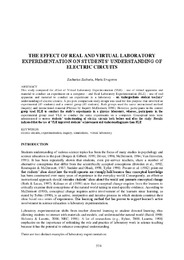The effect of real and virtual laboratory experimentation on students’ understanding of electric circuits

View/
Date
2005Author
Zacharia, Zacharias C.Evagorou, Maria
Publisher
University of ZilinaPlace of publication
CY - ΛευκωσίαSource
CBLIS Conference Proceedings 2005 Integrating New Technologies in Science and EducationGoogle Scholar check
Keyword(s):
Metadata
Show full item recordAbstract
This study compared the effect of Virtual Laboratory Experimentation (VLE) - use of virtual apparatus and material to conduct an experiment on a computer - and Real Laboratory Experimentation (RLE) - use of real apparatus and material to conduct an experiment in a laboratory - on undergraduate student teachers’ understanding of electric circuits. A pre-post comparison study design was used for this purpose that involved an experimental (45 students) and a control group (43 students). Both groups used the same instructional method (inquiry) and instructional material (Physics by Inquiry-McDermott, 1996). However, participants in the control group used RLE to conduct the study’s experiments in a physics laboratory, whereas, participants in the experimental group used VLE to conduct the same experiments on a computer. Conceptual tests were administered to assess students’ understanding of electric circuits both before and after the study. Results indicated that the use of VLE improved students’ achievement and understanding more than RLE.
